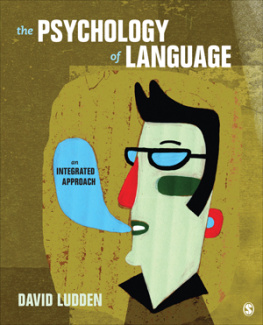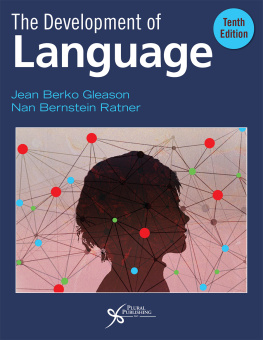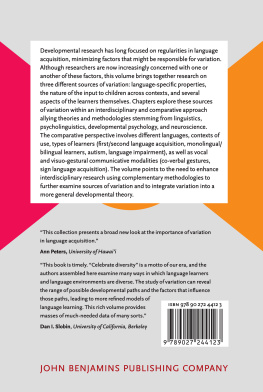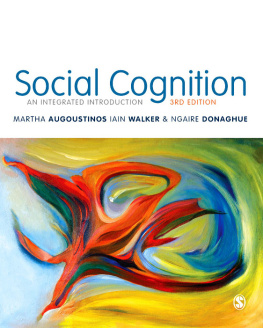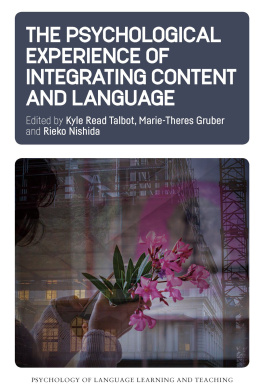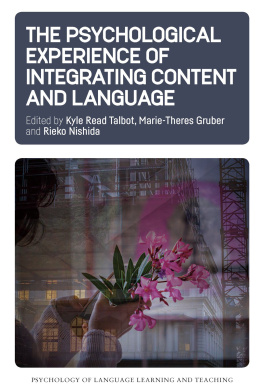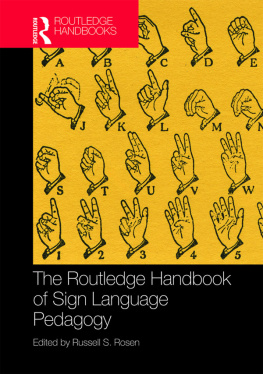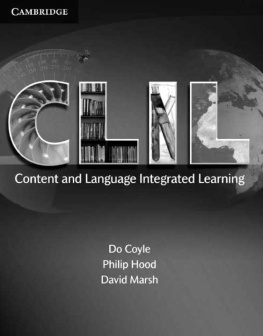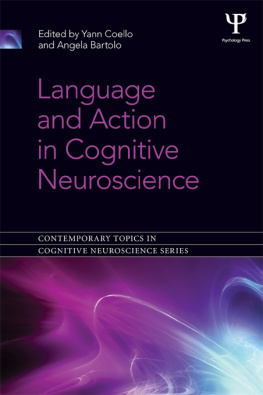FOR INFORMATION:
SAGE Publications, Inc.
2455 Teller Road
Thousand Oaks, California 91320
E-mail: order@sagepub.com
SAGE Publications Ltd.
1 Olivers Yard
55 City Road
London EC1Y 1SP
United Kingdom
SAGE Publications India Pvt. Ltd.
B 1/I 1 Mohan Cooperative Industrial Area
Mathura Road, New Delhi 110 044
India
SAGE Publications Asia-Pacific Pte. Ltd.
3 Church Street
#10-04 Samsung Hub
Singapore 049483
Copyright 2016 by SAGE Publications, Inc.
All rights reserved. No part of this book may be reproduced or utilized in any form or by any means, electronic or mechanical, including photocopying, recording, or by any information storage and retrieval system, without permission in writing from the publisher.
Printed in the United States of America
Cataloging-in-publication data available for this title from the Library of Congress.
ISBN 978-1-4522-8880-2
This book is printed on acid-free paper.
15 16 17 18 19 10 9 8 7 6 5 4 3 2 1
Acquisitions Editor: Reid Hester
Digital Content Editor: Lucy Berbeo
Production Editor: Laura Barrett
Copy Editor: Lynn Weber
Typesetter: C&M Digitals (P) Ltd.
Proofreader: Kris Bergstad
Indexer: Will Ragsdale
Cover Designer: Gail Buschman
Marketing Manager: Shari Countryman
Preface
I got to psychology rather late in my career. From an early age, Id had a driving curiosity about language. In school, English was always my favorite subject, and I took four years of French in high school. My interest in languages led me to a bachelors degree in French and German, followed naturally by a masters degree in linguistics. During my Asia years, I picked up Japanese and two dialects of Chinese. In the meanwhile, I dabbled in a number of languages, working through beginning texts in Spanish, Russian, Latin, and Ancient Greek. Well into my thirties, I thought of myself as a linguist, a scholar of languages.
That all changed during my second year working on a PhD in linguistics at the University of Iowa. Just out of curiosity, I signed up for a Psychology of Language course offered way across campus. It was Gregg Oden who showed me the light (or turned me to the dark side, depending on whose version of the story you choose to believe). After taking Greggs class, I finally knew what I wanted to be when I grew upa psycholinguist!
The following year, I transferred to the psychology department at Iowa, where I benefited from the mentorship of many outstanding scholars. In particular, Id like to thank my advisor Prahlad Gupta for putting up with my impertinence and bullheadedness on many an occasion while managing to teach me far more about the science of psycholinguistics than I had realized at the time. Thanks also to my other mentors at Iowa who guided me down a path that I have never regretted taking. These include Steve Luck, Shaun Vecera, Larissa Samuelson, and also Rochelle Newman, who is now at the University of Maryland.
My first job out of graduate school was at a small liberal arts college where I was half of the psychology department. As a result, I taught most of the psychology curriculum at one time or another, and it was this experience with a wide range of courses that turned me into a generalist. However, as I taught classes like Social Psychology or History and Issues, in which I knew only marginally more about the subject matter than my students, I was repeatedly impressed by the importance of language in every area of psychology, even though it was rarely acknowledged by the scholars of those fields.
Like the air we breathe, language is often taken for granted. Yet language is every bit as vital for our human existence as oxygen. We cannot live without air, and we cannot live a fully human life without language. Philosophers may debate whether its worse to lose the faculty of sight or the faculty of hearing, but blind people and deaf people still manage to lead happy and productive lives. The same simply cannot be said for those whove lost the faculty of language. These unfortunates are relegated to the sidelines of humanity, unable to take part in the most basic of human institutionsfamily, friendship, and community. Indeed, its language above all else that defines us as a species.
This broad view of the role of language in human psychology is what Ive attempted to portray in this book. I didnt want to just write another psycholinguistics textbook, as there are plenty of fine options available for the instructor who wants to take a traditional cognitive approach to the study of language processes. Instead, I wanted to write a book about the psychology of language that integrated all the major approaches of the fieldincluding social, cognitive, evolutionary, biological, cultural, and developmentalinto the discussion. This was my goal, although you the reader will be the one to judge how well Ive succeeded at the task.
I wish to thank my colleague Morris Grubbs and my wife, Yawen, for convincing me, over a lunch of Thai curry, that I really couldand shouldwrite this book. Likewise, I owe an immense debt of gratitude to my editor Reid Hester, who all along has had more faith in this project than I could ever muster. Without Reid imposing impossible deadlinesthat I always somehow managed to meetthis completed textbook would still be lingering in the conceptual stage. The rest of the SAGE team has been wonderful as well. Thanks to Eve Oettinger, my initial contact at SAGE who passed my idea for a textbook on to Reid; to Sarita Sarak, who helped me put together my proposal; and to Nathan Davidson, for his insightful comments on the manuscript reviews. Special thanks go to Lucy Berbeo for her diligence, persistence, and incredible detective skills. Lucy has taught me a lot about the nitty-gritty aspects of putting together a book.
On the homefront, Id like to thank my children Jennifer and Jason, who as recent grads were able to give me a college-student perspective on portions of the text. Id also like to thank my parents, Carol and David, for asking So hows the book coming along? every time we talked. Their confidence in my ability sustained me through hard times. Finally, I need to thank my wife Yawen again for all the emotional and material support she provided me during the two years it took to complete this project. Without her constant encouragement, I never could have written this book.
Publishers Acknowledgments
SAGE gratefully acknowledges the contributions of the following reviewers:
- Tamiko Azuma, Arizona State University
- Natalie Kacinik, CUNY Brooklyn College
- Anna B. Cielicka, Texas A&M International University
- Neal J. Pearlmutter, Northeastern University
- Lydia Volaitis, Massachusetts Institute of Technology, Program in Writing and Humanistic Studies
- Laura Sabourin, University of Ottawa
- Ann R. Eisenberg, The University of Texas at San Antonio

